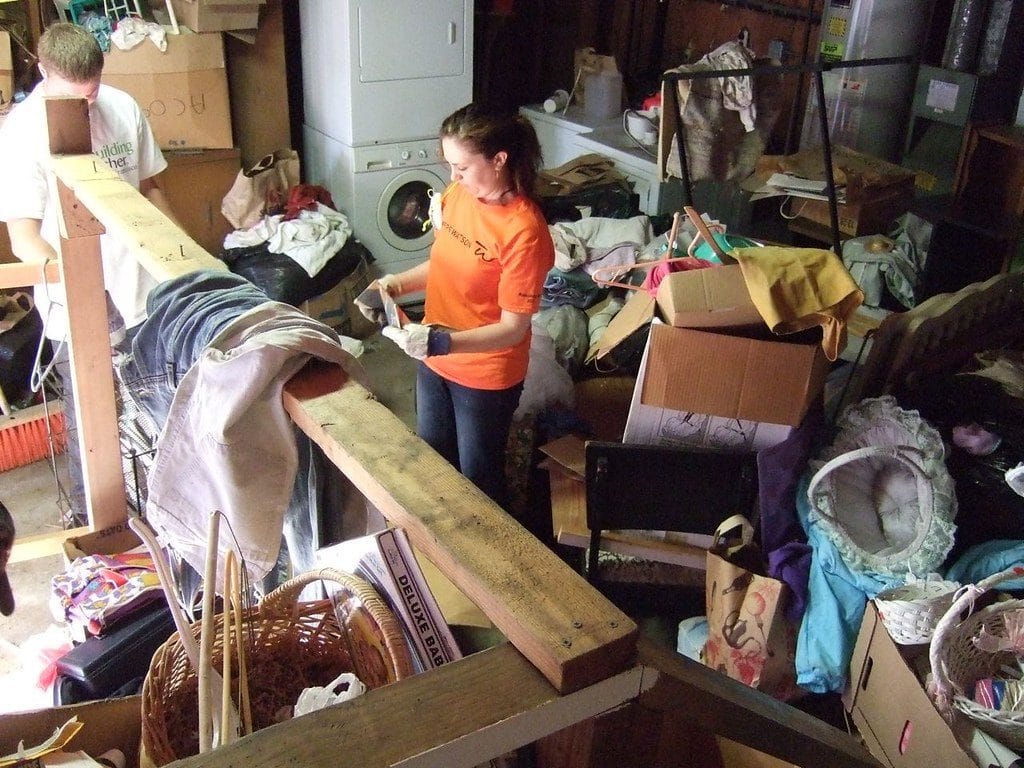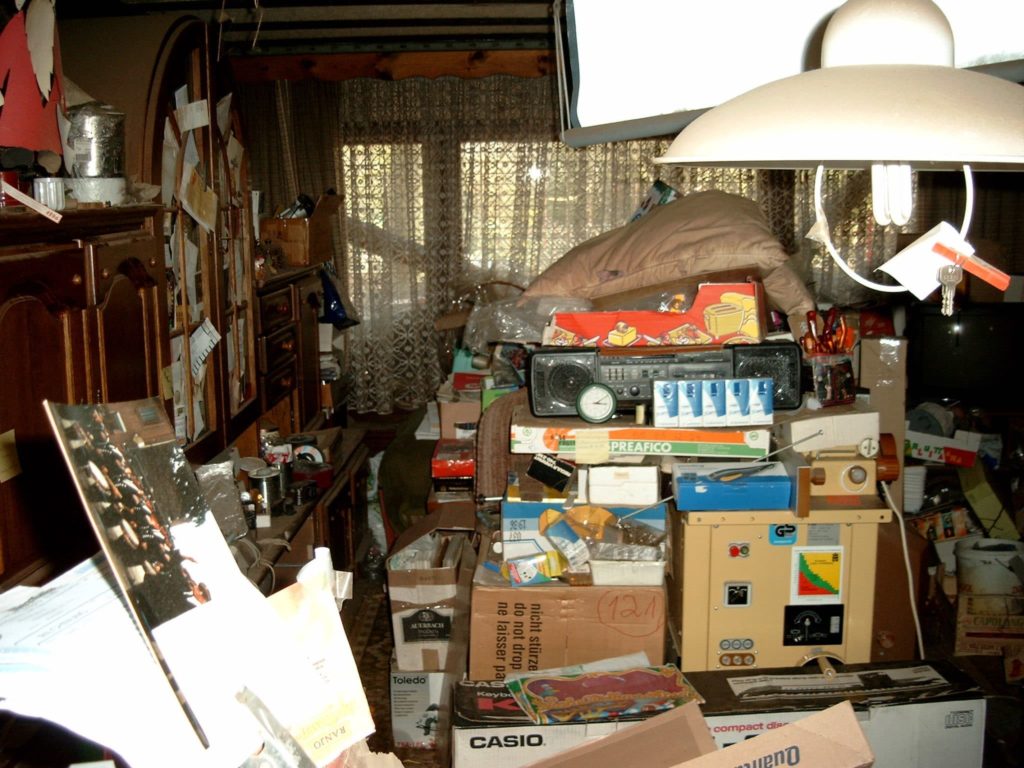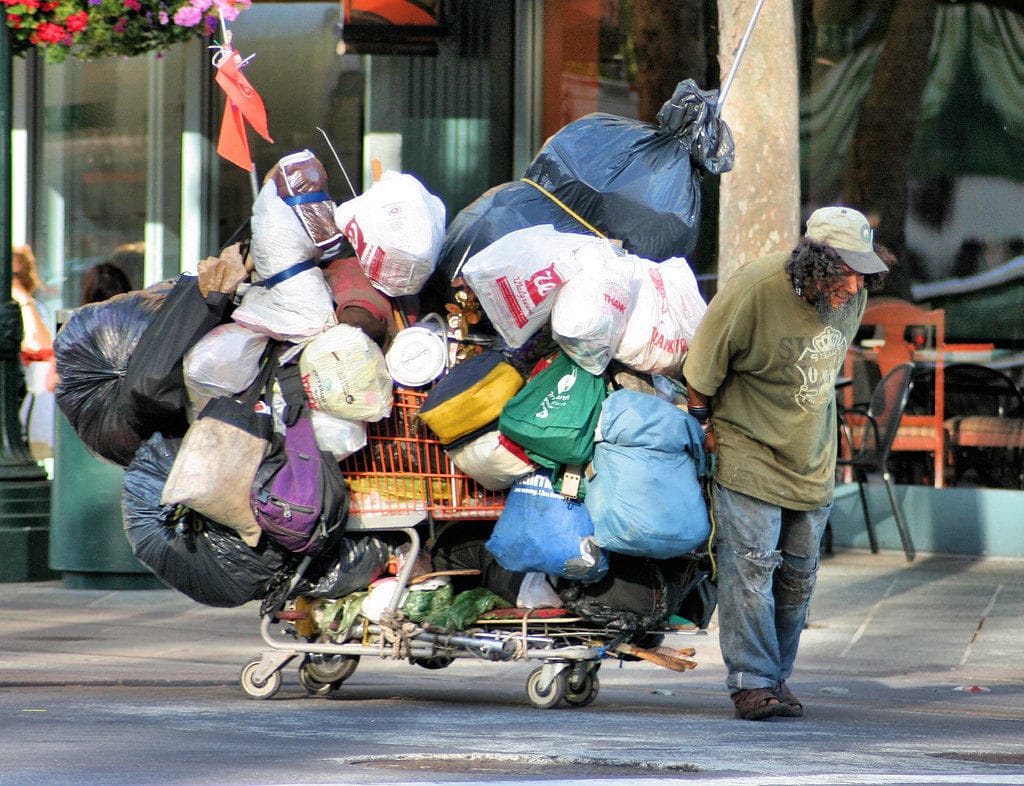Do Cleaned Up Hoarders Go Back to Hoarding
What Is Hoarding Disorder? What You Can Do?
Growing up, I spent a lot of time at my grandmother's house. I would go to her house right after school, and sometimes I would even spend the night with my two other cousins. I would also spend the weekends there if my parents had to work. Every Saturday, there was one thing that my grandmother loved to do — shop at yard sales. We would leave in the mornings and spend all day driving around to various yard sales, and my grandmother would find multiple things she "needed" to have at every single one. By the end of the day, we would come home with a Tahoe full of items, varying from dolls, home decor, clothes, small appliances, and any random knick-knacks that caught her eye. Over time, the house was filled with random things my grandmother never seemed to find any valuable use of. This caused everyone to be forced to squeeze through hallways, trip over random items, close and no longer use certain rooms, and even struggle to open closet doors due to the clutter that laid behind them and I didn't know how I can help her. I understand that she is a hoarder. But how to help a hoarder clean their house?

My family tried to have many conversations with my grandmother, but none of these conversations seemed to work. My grandmother would get angry and constantly refuse to throw away any of her possessions. Sadly, it wasn't until my grandmother passed away when I was 11 years old, that her home was finally cleaned out. As my family cleaned out the home room by room, they found a lot of damage to the home that went unnoticed due to the amount of clutter that covered it. After the home was cleaned out, my family made the decision to tear the entire house down and build a new home for future sale. Unfortunately, my grandmother never allowed anyone to help her with her hoarding disorder in order for her to live a cleaner and more organized life. However, I'm not sure my family knew much about hoarding disorder back then. Maybe if they did, they could have looked into finding professional help and learned how to help a hoarder to clean their house.
What Is Hoarding Disorder?
The American Psychiatric Association recognizes hoarding as a mental disorder, but it wasn't always seen this way. In earlier years, hoarding was viewed as a form of obsessive-compulsive disorder (OCD). People dealing with this disorder have a constant issue getting rid of their possessions. This leads to clutter that can disrupt their way of living with others. They save random items that they deem as important or holding value and store them in places that can lead to hazardous conditions.
According to psychiatry.com, an estimated 2 to 6 percent of the population has hoarding disorder. According to their research, hoarding disorder is more common in males than in females and more common in older adults around 55 to 94 years old.
Consequences
Hoarding disorder can lead to issues in relationships, social activities and work activities, and other areas of daily life functioning. Hoarding can cause health and safety concerns, family strain and conflict, isolation, and problems performing daily tasks. As their clutter continues to grow, it can become very difficult to remove dust, pet hair, grime, pollen, spilled liquids, and any other common household irritants. These irritants left unattended can lead to mildew, fungus, and unwanted pests. Also, leaving individuals with allergies, breathing problems, and headaches.
Excessive clutter can even stop families from being able to leave their homes in case of emergency or can prevent the emergency response from entering the home during emergencies. The weight of clutter can cause major amounts of pressure on floorboards and cause damage.
Diagnosis
A hoarder has psychological, deep-rooted reasoning behind their hoarding and may experience panic and frustration when having to get rid of their possessions. Symptoms of a hoarder may include:
- Problems throwing away possessions of any value
- problems are caused by an obsessive need to save items and distress linked to getting rid of them
- items block and fill living spaces making them unusable
Many people with hoarding disorder may not understand the issue of their clutter, while others acknowledge their problem. Individuals with hoarding disorder may experience problems with indecisiveness, perfectionism, procrastination, and disorganization. They may also experience other mental disorders, like anxiety, depression, alcohol use, or attention-deficit/hyperactivity disorder.
Living With A Hoarder
Living with someone with hoarding disorder can a lot of conflict in the living situation. Hoarding is a disorder that can cause serious issues to the health and safety of anyone living in those conditions. Hoarding is a mental disorder that is deeply ingrained in a hoarder's mind and habits.

As a friend or loved one, you can heal them, but solely provide them with love and support. It is important to educate yourself on this disorder and learn how you can help them. There are many websites and foundations that offer helpful information and resources. Through this information and resources, you can learn about what your friend is dealing with and how to help them control their disorder and deal with the problem.
What You Can Do
1. Understand That This Is A Serious Disorder.
Develop compassion and patience in order to help your friend. This may not be easy, but it is an effective way to help you through the situation. Doing your research on the disorder can help you find compassion for your loved one.
2. Educate Yourself
There are many websites that can be used to help you understand the disorder and support your loved one. The more you learn and understand the disorder, the more you will be able to help your loved one.
3. Take Care of You
Hopefully, after educating yourself on the disorder, you can have a conversation with your loved one and convince them to meet with a professional who specializes in helping hoarders. You can also help yourself by giving them a room for their stuff. Pick a room with a door, so you don't have to look at the clutter. Understand that your partner struggles with throwing away things, and it causes distress and anxiety.
If Your Neighbor is A Hoarder
Having a hoarding neighbor is very different than simply having a messy neighbor. If your neighbor is dealing with a hoarding disorder, reacting with compassion is an essential first step. Hoarding is a serious mental illness and not a controllable action or choice of your neighbor. The disorder can cause various psychological and physical problems with your neighbor and you, while affection the safety of your neighborhood. The collection of trash and clutter can attract animals, create fire hazards, public health, and hygiene violations.

What To Do
Your best bet is to find help from the state or local government. Your city could have social welfare workers; they receive anonymous tips, and investigators will speak to your neighbor and evaluate the situation. In result, your neighbor could get the appropriate help they need and live a better life because of it.
Save Yourself as A Buyer
As someone looking to buy your dream home, the last thing you want to do is seal the deal, spend the money, move in, and begin to notice all of the signs of a hoarding neighbor that you didn't notice during your previous inspections. To solve this problem, it's important to notice the red flags as a shopper. Clutter in the front yard or a neglected exterior are some obvious signs of red flags, but you can even search local records for any complaints.
Children of Hoarders
Being a family member of someone dealing with hoarding disorder can be a stressful situation. Living with this person can cause a lot of tension while having to live with extreme clutter. Even family members that don't live with the person could also experience a lot of physical and emotional difficulties. Conflicts will arise when the hoarding leaves the home with very little usable space. Areas like the kitchen, living room, or office space are now clutter with the hoarder's possessions rather than making room for appropriate furniture and appliance use. Financial strains can come from a hoarder's excessive need to shop to get more things. Their purchases are usually not discussed with their families. Major conflict can also arise if a family member tries to clean or organize the clutter.
What Children Go Through
Children living with someone dealing with hoarding disorder can deal with an affected social life and development. They are commonly too embarrassed by the clutter and refuse to have friends visit or sometimes are not allowed because of the parent's embarrassment. This problem can lead to isolation, depression, anger, and resentment. Some children may believe that their hoarding parent loves their possessions more than their own child. In the long run, legal issues could come up if anyone becomes aware of the home situation and becomes concerned with the safety of the child and chooses to call Child Protective Services. This will involve an investigation, and children could be removed from their home and moved into other living arrangements.
Adult children can also be affected by their hoarding parent and have a struggling relationship with their parent. When they decide to move out on their own, they could become distant from the parent due to disagreements and resentment revolving the parents hoarding disorder. Adult children could also be given the role of a caregiver for their parent, which could cause a lot of stress and tension. Being a caregiver can result in increased worry, conflict, anxiety, depression, and the inability to cope with the issues of the hoarding disorder.
How To Help A Hoarder Clean Their House
- Step One
How to help a hoarder clean and organize their home? It's important that you learn about the disorder and possibly seek professional help. After you have a conversation with the hoarder about their home, you can begin to help them clean and organize. Review the situation and make the decision on whether or not you need to hire a professional organizer or how many people you will need to help you with the process.
Have a conversation with your loved one dealing with hoarding disorder about your plan and ensure them on your plan of safety and confidentiality. Talk to them about how organizing their home will make it a safer place to live and tell them that you are simply there to support them, not judge them. Also, try to use neutral language while talking to them. Avoid words like 'unsanitary' or 'clutter'; these words may cause them to become defensive.
- Step Two
Once everyone is under the agreement and you understand how to help a hoarder clean their house, it is time to start cleaning the home. You will need to start with an action plan to complete the project. Help your loved one create criteria to determine what should and shouldn't be thrown away. Allow them to oversee this process. Next, decide what order you will go through each room and determine how much time it may take to clean and organize each room. Then, set your goals to keep everyone focused and motivated.
- Step Three
After you develop your plan, it is important to know where all this clutter and waste is going to go. When working with someone dealing with a hoarding disorder, you will probably be throwing away a lot of waste. Everyone will need a quick solution when it comes to moving the debris out of the home. Renting a dumpster may be a good option for a project like this, but you can also utilize other options like curbside pickup and junk removal services.
- Step Four
Now with your plan and strategy ready to go, you can begin cleaning and organizing the home. Remove clutter from the home, organize, and then start cleaning. Understanding how to help a hoarder clean their home and make this work done can be an exhausting process. Take as many breaks as you need, and stay focused and positive.
Trying to help someone with a hoarding disorder can be an emotionally exhausting process, but it is totally worth the struggle. Hoarding is a serious disorder, should be taken seriously and handled with compassion. In the end, you could be changing the life of this person for the better. Seek professional help if it is needed and if you are not sure how to handle the situation. Hoarding disorder is something that can cause a lot of strain on families, neighborhoods, and the person dealing with the disorder. However, remember that the hoarder does not cause this strain because they want to, but it is an action that they cannot control. They need love, patience, and compassion to help them through this process.
Do Cleaned Up Hoarders Go Back to Hoarding
Source: https://cluttertrucker.com/how-to-help-a-hoarder/
Post a Comment for "Do Cleaned Up Hoarders Go Back to Hoarding"